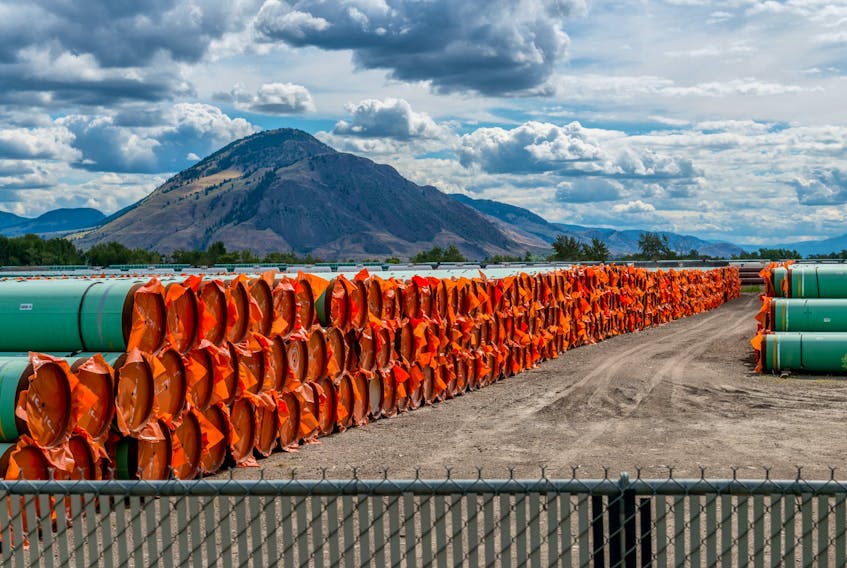The Supreme Court unanimously dismissed British Columbia’s attempt to block the Trans Mountain pipeline expansion (TMX).
Ironically, Vancouver is the largest coal exporter in North America.
Then, on Feb. 4, the Federal Court of Appeal unanimously ruled against four indigenous challenges to TMX.
In recent days, anti-pipeline activists blocked rail lines near Belleville, Ontario.
As Indigenous activist Pam Palmater asserted (CTV “Question Period,” Feb 9, 2020), “The fight is clearly not over.”
Yet all Canadians should be interested, for the outcome of this dispute will affect funding of health and social programs nationwide.
On Dec. 9, 2019 and Feb. 6, 2020, CP railcars derailed within 10 km of each other near Guernsey, Sask., resulting in major fires.
Recall the 2013 Lac-Magantic, Que., disaster which caused 47 deaths. From 2009 to 2013, tanker cars carrying oil have increased by a factor of 50. A Fraser Institute study found that pipelines were four times safer than rail transport
Federal debt has increased 5.6 per cent over the past four years – the largest increase when there was no war or recession.
The total debt of Newfoundland and Labrador is $13 billion, the highest per capita of any province.
Ontario and Quebec are also heavily indebted. Many provinces rely on equalization payments (Quebec about $13.2 billion, Manitoba and New Brunswick about $2.2 billion, and PEI $400 million per year).
Sadly N.L. receives no equalization payments. Furthermore, in a couple of years, N.L. must pay interest on the $12-billion Muskrat Falls debt.
All provinces also depend on the Canada Health Transfer for 20-25 per cent of their health budgets.
Due to the Canada Health Act, privatization of most services is illegal so that our health system is almost solely supported by government revenues.
With already overcrowded hospitals and patients lying in hallways, we are certainly poorly prepared with no surge capacity.
Except for severe global economic effects, we may well “dodge the bullet” of the novel coronavirus, which has claimed more than twice as many lives than did SARS. But what of another future pandemic? We need additional health funding soon.
Government revenues from energy are currently $14.1 billion annually – some 11 per cent of our national GDP. If our natural resources cannot reach world markets at fair prices, the unpleasant alternative choice for increased funding of health and other social programs is to raise sales and/or personal income taxes.
If TMX remains mired in appeals and demonstrations, consider two partial solutions:
Plan A: The moribund Energy East pipeline. The pipeline was to run from Hardisty, Alta., to Saint John, N.B. Quebec Premier Francois Legault did favour the pipeline in 2016. However, recently, he told Jason Kenney that there was still “no social acceptability for a new oil pipeline in Quebec.”
Thanks to a reversal of Enbridge Line 9B into Montreal in 2015, half of the oil used in Quebec comes from the West. If Legault still refuses to allow new pipeline construction to New Brunswick, consider another route:
Plan B: The Portland-Montreal Pipeline opened in 1941 to convey foreign oil to Montreal. The South Portland Planning Board approved a proposal to reverse the pipeline’s flow in 2009. However, the South Portland city council passed an ordinance in July 2014 which prohibited the bulk loading of crude oil tankers. Since 2016, this pipeline has been unused. On Jan. 10, 2020, a Boston court referred the matter back to the Maine court. A decision may take six months.
Oil could flow through this existing pipeline route without the need to jump through the hoops of the Liberal Bill C-69. It might be the only way around persistent opposition by Quebec politicians about constructing new oil pipelines through the province. It would provide access to Atlantic tidewater so that a significant amount of Western oil could finally reach world markets.
As Alberta Premier Jason Kenney asserted, “TMX will result in billions of economic prosperity for Canadians … So please remember that when you see one or two groups expressing opposition, they are trying to veto the right of 95 per cent of the affected First Nations to benefit economically.”
Charles S. Shaver,
Ottawa









